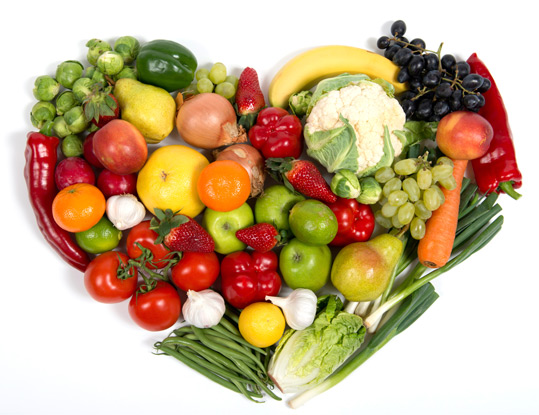The views expressed in our content reflect individual perspectives and do not represent the authoritative views of the Baha'i Faith.
Do not neglect medical treatment when it is necessary, but leave it off when health has been restored. Treat disease through diet, by preference… Abstain from drugs when health is good, but administer them when necessary. – Baha’u’llah, quoted in Baha’u’llah and the New Era, 1980 ed., p. 106.
Nutrition may not seem ‘spiritual,’ but it has roots deep in the Baha’i teachings. This series of essays provides a basic introduction to the Baha’i view of food and the part it plays in our lives; shows how the principles of the Baha’i Faith relate to the food choices we make; and suggests ways to put these spiritual principles into action.
In these short essays I’ll discuss my personal understanding of one approach to food and nutrition based on the Baha’i writings. As I wrote this, my thinking evolved drastically from my initial plan of approaching nutrition from a clinical point of view. While I studied our human relationship with food, I began to see the unity and interconnectedness of all the Baha’i teachings on this topic.
RELATED: 9 Health and Wellness Tips from a Baha’i Perspective
So how do we approach food and nutrition from a spiritual perspective?
While no specific Baha’i ‘diet’ exists, Baha’is do have some guidelines about where we – as a civilization – will move towards in the future. Baha’is see nutrition, then, as a process, individually and collectively, of moving towards health–not just for ourselves, but for every living thing on the planet.
The Baha’i teachings have no hard and fast laws regarding diet. So no one has any obligation to follow any of the following dietary suggestions, of course. But if we have the desire to explore more deeply these principles, we can move closer to understanding them in a new light.
First: we need food to survive, plain and simple. We can’t live without it.
But, our relationship with food goes far beyond mere survival. Food encompasses feelings of love, community, and connection. Culturally, through the ages, food played a role in keeping a group bonded together, and social traditions often passed down from generation to generation, usually centered around celebrations and feasts.
But now, beyond that, the food choices we make have a huge impact on every living thing – on other people, on animals, on plants, and on the environment. We need to embrace global thinking in the food choices we make. We are not just a family or a tribe or a village—we are one world, each of us citizens of a single planet.
RELATED: 4 Benefits of Going Vegan for the World—and You
We often think of food in self-centered ways. It might be to control our outward appearance – to be a certain weight; to fit into a certain size jeans; or to ‘look good’ to others. All of these thoughts are based on cultural and material perceptions from our culture. They are not based on our spiritual reality. So we tend to look at food from a self-centered view and not from a spiritual perspective.
So we might want to ask ourselves for the first time: Why do we eat? What is the purpose of choosing the foods we eat? If not to get six-pack abs, then why should we care about what we eat? In the Baha’i view:
Looking after one’s health is done with two intentions. Man may take good care of his body for the purpose of satisfying his personal wishes. Or, he may look after his health with the good intention of serving humanity and of living long enough to perform his duty toward mankind. The latter is most commendable. – Abdu’l-Baha, Star of the West, Vol. VIII, No. 18, p. 230.
Now we know why we should eat healthfully. But, since the Baha’i teachings don’t specify a specific diet, what next? Abdu’l-Baha did give us some glimmerings of where we need to go, as in this quotation:
What will be the food of the future? Fruit and grains. The time will come when meat will no longer be eaten. Medical science is only in its infancy, yet it has shown that our natural diet is that which grows out of the ground. The people will gradually develop up to the condition of this natural food. – Abdu’l-Baha, The Days in the Light of Akka, pp. 8- 9.
Here Abdu’l-Baha refers not only to fruit and grains–in other writings, he speaks of legumes, nuts, oils, and vegetables as part of the diet humanity will eventually adopt.
You May Also Like
Comments


















If our diet should enable us to be of service:
1. What service should we provide?
2. What are the health and nutrition needs to support such services?
3. What nutrition and lifestyle choices should we make to provide this support?
http://www.theatlantic.com/health/archive/2014/08/almonds-demon-nuts/379244/
It seems to show that society is shifting as Abdu'l-Baha expected. There will be adjustments, as farmers learn how to change to better crops!
1. I began seriously looking at my food expenses; why I eat; what I eat;
2. I have to think about protein, as this is the most expensive thing in my diet. So I have changed my intake of amount and kind of protein i order to control my expenses. Just to take 1 example, McDonald's Chicken Crisp, for all the criticism, is inexpensive protein. Another factor is that often quality costs. It is all very well for a ...middle-class American, or a person with access to a large garden area and spare time to advocate growing ones own garden. But many of us live in an urban area; hold down 2 jobs. we have a small apartment, and we spend our daylight time working. we go to the supermarket in our area and make the choices based on our limited time and knowledge.
3. Food is love. How much we are attracted to someone who can cook, or bake! This is why men are attracted to women, or women can be captured by a man who can cook. One of my strategies to capture my wife during our courtship was to prepare complicated salads for her, and bake bread. So just a few weeks ago I decided to order a bread-maker, and try to recapture that spirit of service, by baking again...It will take approx a month to arrive from the US.
4.I used to live in Southern Calif. so I am concerned about water usage; and how much water our typical unthinking lifestyle takes for granted the resources of the planet. Online I was having a discussion about the amount of water used to grow beef cattle, compare to almonds. You know almonds are now a new fad food. the price of almonds has increased about 20% in the past 2-3 years here in Japan. From what I can understand, a pound of almonds (about 380) uses more water than growing a pound of beef!! (though finding current comprehensive water use measurements are a bit tricky).
4b. There is a USDA web site for a quiz on what you think water requirements are for a pound of various foods, and of course there are questions about how the calculations were arrived at, still it makes one think.
5. I would like to end my comment by returning to what is a key quote you made from Abdu'l Baha
"Or, he may look after his health with the good intention of serving humanity and of living long enough to perform his duty toward mankind. The latter is most commendable."
Thank you Tash-san